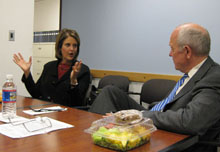
November 12, 2008 — The 2008 election was one of the most analyzed, debated, and watched in American history. Whether working for the mainstream press or in the new-media jungle of websites and blogs, reporters and commentators were everywhere, and none more so than those of CNN. “There was not one piece of tape anywhere, at any event, that we missed,” said Gloria Borger, a senior political analyst for the network and contributing editor at U.S. News & World Report. Interviewed by Shorenstein Center director Alex S. Jones, Borger gave a recap of the presidential race and detailed how the public’s overwhelming interest in this election drove coverage.
“What we saw was — at conventions, primaries, and finally election night — that people wanted more rather than less,” Borger said, speaking to a full house at the Shorenstein Center brown-bag lunch. “They wanted to see it all for themselves, and they didn’t want the network to distill it down to a minute…. This election has worked for us because we gave people more rather than less.”
And that they did. On election night CNN featured, in addition to the network’s analysts, some 16 pundits representing a range of opinions. How did CNN navigate the “murky ground” between reporting and punditry, Jones asked. “We had a front row and a back row,” Borger replied simply. “We tried to identify people like me and John King would talk about our analysis and reporting…. Then we had our independent analysis,” she said, including Republican Alex Castellanos and Democrat Donna Brazile. “David Gergen’s in a different category because he comes under the ‘experience’ label,” Borger joked.
“It’s a way that CNN tried in this election to differentiate itself from the other [cable networks], which is to say that we will give you differing points of view and we’ll also give you our journalists who will give you their informed analysis,” Borger continued. “So there’s a difference between what a correspondent does on the road versus what I do sitting at that table, but they’re both informed by reporting. And for the strategists who were there, they’re informed, but they’re partisans. And they’re openly partisan.”
Borger joined CNN in September 2007, coming from CBS News, where she said election coverage was often restricted to minute-and-a-half-long pieces on the evening news. “CNN had said to me, ‘We are going to make a tremendous commitment to politics,’ and I didn’t really understand what that meant, until I got [there] and saw the extraordinary resources they devoted to this campaign.”
CNN’s weekend Ballot Bowl program was singled out by Borger as part the network’s “transformative” performance during the primaries and campaign. Describing it as “C-SPAN on steroids,” she said that the program gave the network the ability to show viewers the candidates unedited. “It started something cooking,” Borger said. “Suddenly [CNN] realized what they were tapping into, which was this sense that people really cared about this election.”
“We started doing more and more of it,” she said. “It about killed the staff. It’s the most exhausted political team on television, but it was great.”
The network’s innovative use of technology merited a lengthy discussion, including “the holograms” and “the map,” which according to Borger was based on a device seen by CNN producer David Borman at a military-hardware show. “Don’t ask me how it happens — that’s why we call it magic,” Borger joked, “but it does.”
What is a big audience for CNN? Alex S. Jones asked Borger. “Election Night, 12 million,” she replied. “Normally, Larry King or Anderson [Cooper] will get maybe a million and a half.” “On election night, did you beat all the networks?” Jones continued. “All of ’em. Every single one,” Borger said with satisfaction.
While Borger downplayed CNN’s ability to maintain that such high numbers, she felt the network had found its way forward. “They believe that the ‘CNN equals politics’ brand has broken through, and they want to continue that way.” But with the election over and Republicans preparing for an internal “bloodbath,” as Jones put it, will right-leaning cable networks such as Fox have a leg up on CNN? “We can cover that story too,” Borger said with a laugh.
The outgoing party is “in the middle of an identity crisis,” she continued. “There are people who believe you should just stand in the opposition and say no to everything Obama wants, and there are those who say, ‘You have to look at the Republican party and see where you lost, and look at the demographics of this country and how you’ve been left behind.” How that struggle plays out will determine the party’s future, she felt.
The second half of Borger’s talk was wide-ranging, touching on how John McCain found himself on the wrong side of the election’s outcome, Howard Dean’s performance, the role of race in the contest, the upcoming transition, and what the Obama administration’s priorities will be. “He has already said that his priority is economic stimulus, energy, health care, education,” Borger said. “My bet is that they’ll bite off a lot, right away.”
This article was written by and the photos taken by Leighton Walter Kille of the Shorenstein Center.

